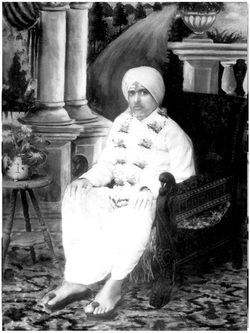
Saurashtra in Gujarat has been veritably called a land of Saints and from times immemorial till recent date, the saying has continued to be fulfilled. Shriman Nathuram Sharma addressed by the large following of his disciples in Gujarat as Krupanath, was in this tradition of Saints, who fulfilled the Vedic dictum 'Brahmavit Brahmaiva Bhavati', One who knows Brahman becomes Brahman. Exactly hundred and twenty five years ago Nathuram was born in the village Mojidad in Surendranagar District in a pious brahmin family. From infancy onwards, his sobriety, keen sense of observation, discrimination and devotion were exemplary. Having qualified himself as a senior trained teacher by studying at Chuda, Limdi and Rajkot he served as a primary teacher in far-off places like Jafrabad, villages of Adveana and Limbdi in Junagadh District etc. All along however his quest for the infinite truth, the search for "Atman" was uninterrupted. His mastery over various practices of Yoga, study of Vedic lore, association with like minded saints of those times and the singular devotion to duty, left an indelienable impression, wherever he stayed and people of those places saw in him the manifestation of Godliness.He took time off from his job for such things as meditation in Girnar, pilgrimage to Himalayas etc. The real crisis reminding one of the great renunciation of Buddha's Mahabhinishkraman-with a difference that he never got entangled in marriage, came when mother and relatives pressed him to marry. The urge of renunciation was so intense that, asking the permission of his mother to go for the worship of Lord Shiva, he left home and disappeared for a considerable length of time, doing penance in the Himalayas
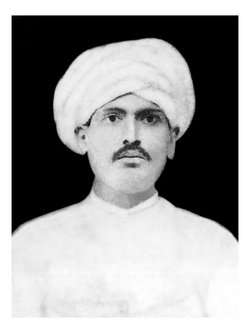
The urge of renunciation was so intense that, asking the permission of his mother to go for the worship of Lord Shiva, he left home and disappeared for a considerable length of time, doing penance in the Himalayas. Realization came in the form of Lord Dakshinamurty and receipt of divine direction to return back to native land and undertake propagation of Saddharma by writing books thereon, for the benefit of Gujarati knowing people. His penance indeed was a momentous effort full of sacrifice and hardship. The state of his mind is reflected in the poetic jottings of those times. He says "O Lord, I have staked everything for your sake, it is now upto you to justify your prowess and adopt me as your own by hugging me to your heart; the times are hard and mounting doubts and half knowledge have made people sceptical; you will forsake your title of invincibility and Godliness if you do not accept me as your servant, yearning for your sole favour. You relished with love a handful of rice offered by Sudama. Nathu's infatuation for you my Lord, is of the same tenor and you have to acknowledge it;" and so on. After return, he again went back to his job assignment to complete the period in the bond of service. His pupils and their parents however, saw in their teacher, a divine soul and his superiors too felt the aura of his saintly personality. He did a stint of service in the then Mangrol State Secretariat as personal assistant to the Administrator as also acted as Administrator in Varal, a small principality near Bhavnagar, whose ruler too was an enlightened soul.
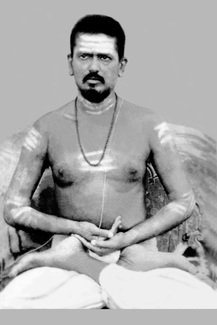
However inner urge made him leave the career of service for one of devotion to the Lord. Profound and solitary meditation and spells of Sadhana followed after which, he emerged in the holy land of Saurashtra as a great Acharya, who was "shrotriya"- possessed of knowledge of shrutis -Vedas, and "Brahmanishtha" meaning realisation of Brahman, the absolute. A large number of followers accepted him as Guru. His disciples constituted a wide spectrum of social hierarchy, ranging from ministers of states to merchants, artisans and other ranks-but once they got initiation, the imprint of the master was so powerful and visible that many later saints cited the example of the excellent moral discipline and elevation of Sharmaji's disciples. His disciples were from all sections of society and communities including Jain, Parsi and Khoja.Sharmaji's contribution to Gujarati literature is invaluable. He commented on Gita, Upanishads and Brahmasutras. The lucid and correct interpretation of the profound truths contained therein, makes his interpretation an authentic one, acceptable to one and all. Every word in his books on Yoga bears the stamp of his experience. Making the most profound synthesis of Karma, Upasana, Gnana and Bhakti, he interpreted in Gujarati, eighteen monumental works of Adi Shankara-charya which it is a treat to go through for the sincere seeker of true knowledge. The 'Shankar Siddhanta, Advaita is the sheet-anchor of his philosophy and someone has rightly said about him, "we knew only after his departure, that in him, Shankaracharya manifested himself back on this land."
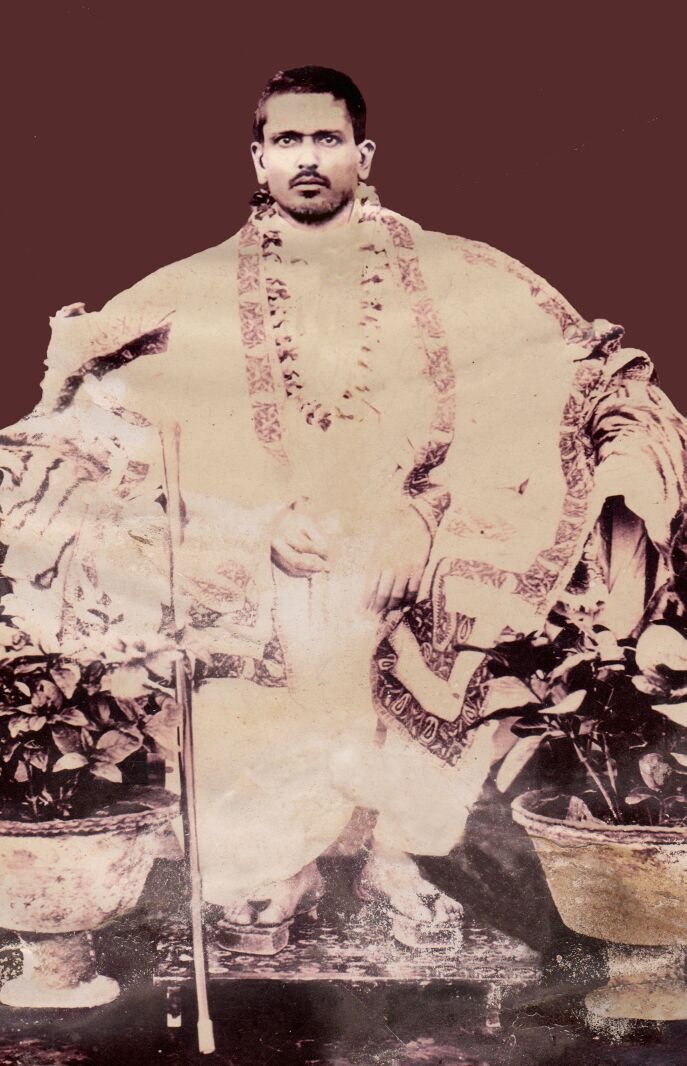
At the age of 32, he was venerated as Acharya by a large following of enlightened people and for the next forty years he ceaselessly and tirelessly worked for propagation of Sanatana Dharma, the eternal religion. He established as his main centre for residence and activity the Anandashrama at Bilkha, near Junagadh. He brought out commentaries on Gita, Upanishads, Brahmasutras, important works of Aadi Shankara, Patanjali Yoga Sutra, Sankhya and Vedanta Darshana and others. His original exposition on subjects— Yoga, Bhakti, Karma and Gnana contained in some 40 books, provide, for anyone pursuing the path of salvation, the full armoury for achieving the goal in this life. Sadguru has been equated with God and more than that because, he makes his disciple realize Him through his prowess and. guidance. At one place Sharmaji has described the qualification of an Acharya : "The perfect knowledge of content and significances of the scriptures which preach Moksha, mastery of the technique of conveying convincingly the concept of 'Advait' by establishing convincingly the futility of dulality, observance of unblemished virtue without a moment of neglect, never allowing the mind to get sullied by a touch of passions or desire, realisation of one's real Self, as also the manifest world as the "Vivaria'' of Brahman and stabilizing it in the inner consciousness, never getting flustered or touched by any passion, to base his reasoning in consonance with Vedic Directives and to dispel others' doubts effectively, radiating infinite compassion," and these qualities were embodied in him, to perfection.
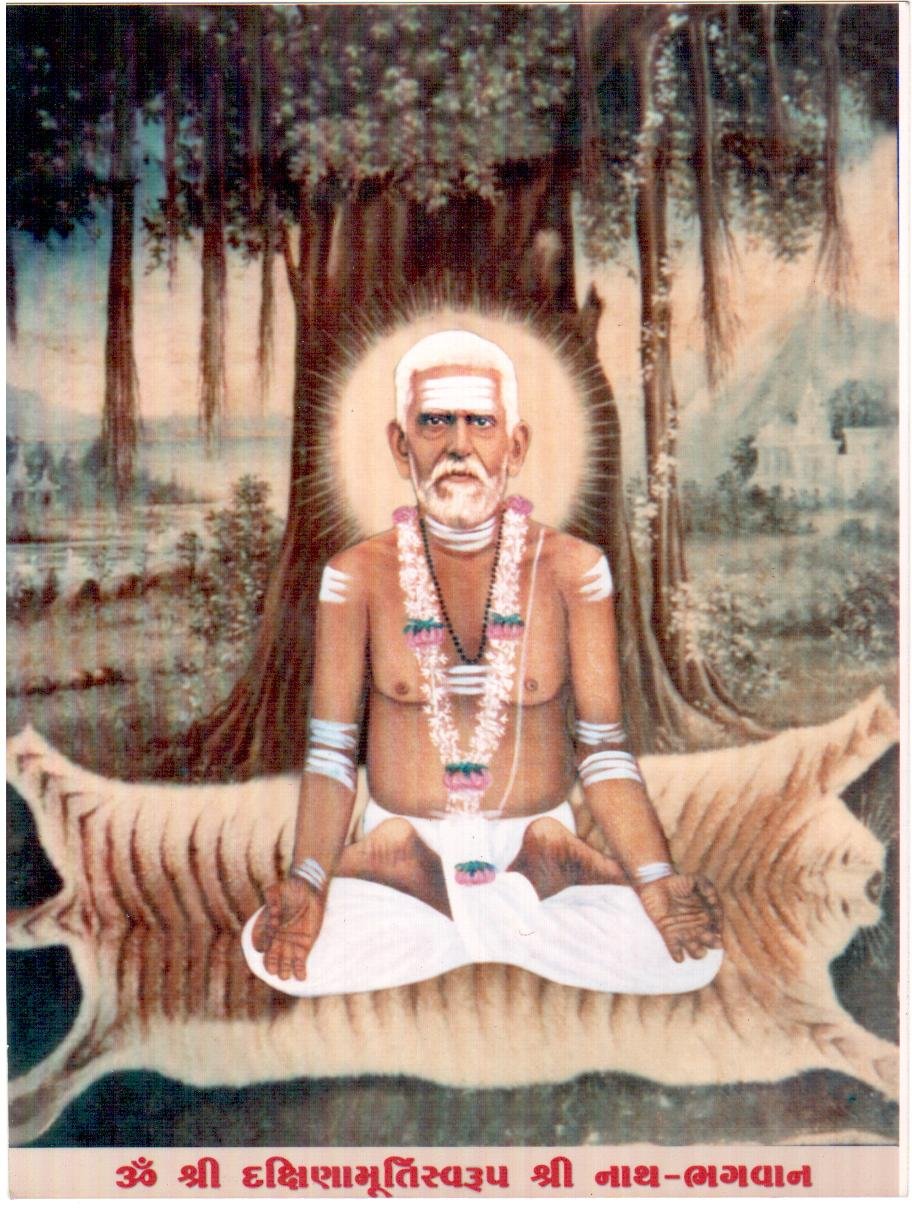
A few illustrative excerpts from his books are given below:-
"Knowledge of Brahman is the powerful sword which alone can dispel the knot of ignorance (Avidya) which vests the Ego in one's corporeal body, and all the so-called beauties or blemishes associated therewith, resulting in the play of the qualities of joy and sorrow, ecstacy and depression, hope and despair and so on. This alone can make you conquer the agony of death by identifying yourself with one who is 'Sat', 'Chit' and 'Anand,' the true, the good and the beautiful at all times. The mind, the intelligence, and the ego naturally tend to lean towards earthly passions, clouding the real Self and which makes one conscious of the tantalising natureof the so-called happiness, ultimately observed to be a mirage of vanity and leaving one craving for more but not able to gain anything in substance or permanence. In this fleeting drama and panorama of the Universe, the only thing worth realizing is therefore one's own identity with the Supreme. The path of such realisation can be traversed by one who masters his emotions and passions; then only contemplation of or identification with Brahman which is manifest in the minutest form invisible to our eyes of worldly experience is possible."